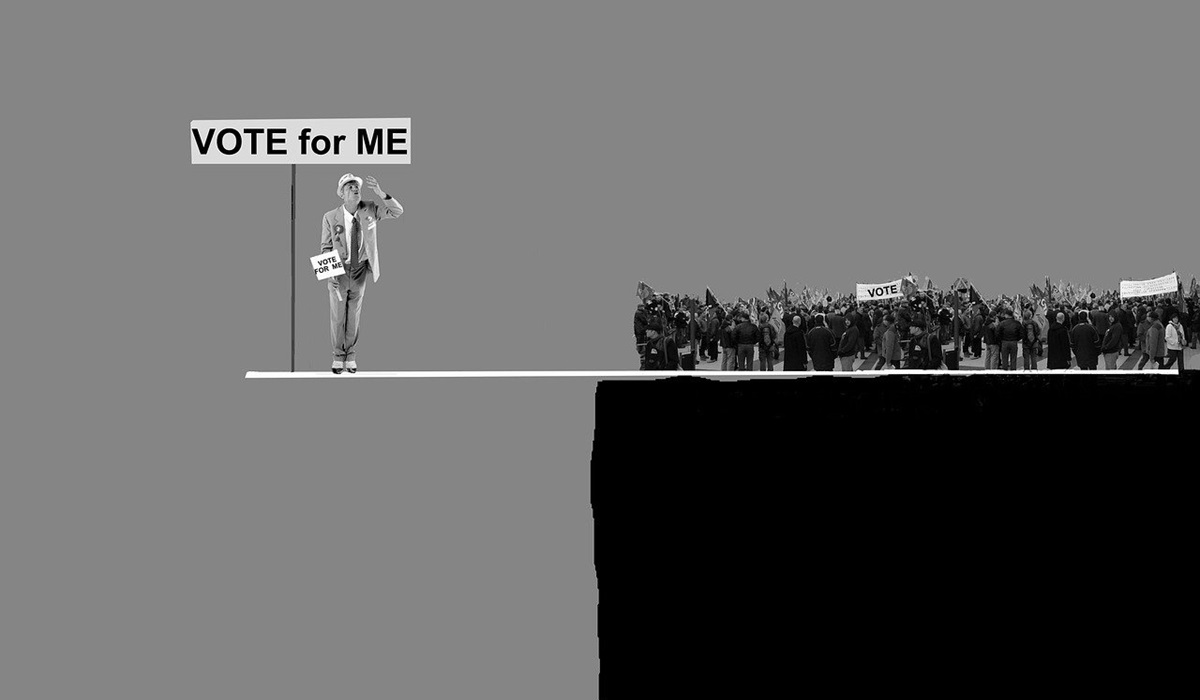Image Credit, Marc Hatot
Democracy is often hailed as the epitome of political systems, where the will of the people is paramount, and leadership is accountable to the electorate. However, this idea can sometimes morph into a paradox when a democratically elected leader diverges significantly from their campaign promises, enacting policies that many citizens did not anticipate or desire. This phenomenon raises crucial questions about the nature of democracy, the motivations of voters, and the broader implications for society.
Election campaigns are built on promises of change and progress. Candidates often present themselves as agents of transformation, aiming to address the electorate’s grievances and aspirations. However, the reality post-election can starkly contrast with these promises. When elected leaders reveal their true intentions, enacting policies that lead to widespread discontent, it exposes a rift between electoral rhetoric and governance.
Consider a scenario where a leader, campaigning on a platform of economic reform and social progress, instead implements policies that exacerbate inequality, restrict freedoms, and create socio-economic instability. This betrayal can be disheartening for voters who believe in the potential for positive change, leading to questions about the leader’s authenticity and the electorate’s judgment.
The consequences of electing such leaders can be profound and long-lasting. Policies that undermine democratic institutions, erode civil liberties, and polarize society can leave a nation grappling with deep-seated issues that are not easily rectified. Economic mismanagement can lead to financial crises, increased poverty, and unemployment, while social policies that promote division can result in heightened tensions and conflict.
The damage inflicted by such leaders often extends beyond their tenure. Institutional trust can be eroded, and rebuilding it requires significant effort and time. Furthermore, the socio-economic fallout can take decades to address, leaving lasting scars on the nation’s fabric.
Despite the evident damage, it is not uncommon for such leaders to be re-elected. This phenomenon raises perplexing questions about the electorate’s motivations and the resilience of democratic principles. Why would a nation choose to revert to a leadership style that has previously led to adverse outcomes?
Several factors can contribute to this paradox. In some cases, voters may prioritize short-term gains over long-term stability. If a leader’s policies benefit a particular demographic or interest group, those voters may overlook broader societal harm in favour of their immediate interests. Additionally, fear and uncertainty can drive voters towards familiar, albeit flawed, leadership, rather than risking the unknown with a new candidate.
The re-election of such leaders suggests a complex relationship between democracy and the electorate. It raises the question of whether voters genuinely believe in the democratic process or if they are primarily concerned with their own interests and security. This disillusionment can manifest as voter apathy, polarization, and a diminished belief in the efficacy of democratic governance.
In some instances, the notion of democracy itself becomes irrelevant to those who feel their interests are safeguarded. This can lead to a transactional view of democracy, where the system is valued only as long as it delivers personal or group benefits. Such a perspective undermines the collective ethos of democracy, reducing it to a mechanism for self-preservation rather than a shared commitment to societal progress.
The willingness to revert to detrimental leadership highlights significant societal and human tendencies. It underscores the importance of collective consciousness and the need for a populace that is informed, engaged, and committed to the common good. The tendency to prioritize personal safety and interests over democratic principles reveals an inherent tension between individualism and collective responsibility.
This dynamic necessitates a broader reflection on societal values and the education of the electorate. It calls for a renewed focus on civic education, critical thinking, and the promotion of democratic values that transcend personal gain. Only through such efforts can the electorate be empowered to make informed choices that reflect a genuine commitment to democratic principles.
The concept of democracy often appears straightforward, but in practice, it is fraught with complexities and contradictions. The blurred lines between promises and actions, rhetoric and reality, and transparency and opacity, challenge the very essence of democratic governance. These ambiguities can lead to a sense of disillusionment and cynicism among the electorate.
However, it is crucial to recognize that these challenges are not inherent flaws of democracy but rather reflections of human nature and societal dynamics. Democracy is a living, evolving system that requires constant vigilance, participation, and adaptation. It demands a populace that is not only aware of its rights but also its responsibilities.
The paradox of electing and re-electing leaders who fail to deliver on their promises and cause irreparable damage underscores the complexities of democratic governance. It reveals the tension between personal interests and collective well-being, highlighting the need for a more informed and engaged electorate. While the lines between transparency and opacity in democracy may seem blurred, they are navigable through a commitment to democratic values, education, and a collective sense of responsibility.
In the end, democracy is not merely a system of government but a reflection of societal values and human nature. It is a continuous journey towards a more just, equitable, and participatory society, requiring the active involvement of every citizen. As we reflect on the challenges of democratic leadership, it is imperative to remember that the strength of democracy lies in its ability to adapt, evolve, and ultimately, reflect the will of an informed and engaged populace.









